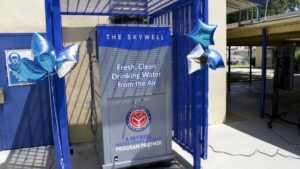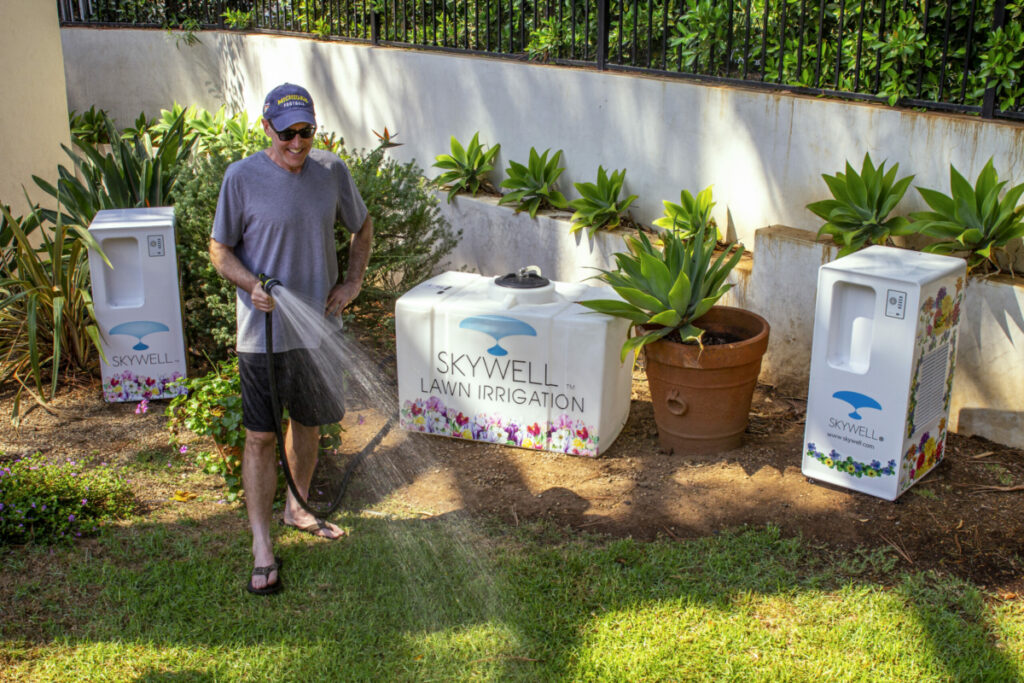Steve Engel was growing desperate. Earlier this summer, the Pacific Palisades homeowner feared that the recently enacted limit on outdoor watering to just two brief periods a week would effectively kill most of his flowering plants and fruit trees.
“I cannot run my hoses for much of the day, or else I face a financial penalty,” Engel said. “I also want to do the right thing and conserve water.”
Then Engel, a television writer and producer, heard from a friend about a company with a device that pulled water out of the air – water that could be used for outdoor irrigation, bypassing municipal tap water. It sounded almost too good to be true.

Engel contacted the company, which turned out to be Santa Monica-based Skywell. He ultimately ordered a pair of the company’s atmospheric water generators – and a 100-gallon storage water tank to go along with them. Total up-front cost: about $5,000.
And not a moment too soon. Less than two weeks after Skywell’s water system was installed at Engel’s home, Southern California entered a 10-day heat wave. Unlike many of his neighbors, Engel was able to draw water from his Skywell system and the storage tank to save his plants and trees.
“It was a godsend,” he said. For Skywell, this summer’s sizzling temperatures has sparked increased interest in its machines that extract water out of the air.
“We’re getting calls now from concerned homeowners who can only water once or twice a week: neither limit keeps their lawns and plants from dying,” said Ron Dorfman, Skywell’s founder and chief executive. “We can offer them their own private water reserve.”
Rethinking water coolers
When Dorfman founded Skywell nine years ago, however, he had a completely different purpose in mind: giving office workers another option to bottled water or inferior water-filtration systems. At the time, he was recently out of law school and working for a large law firm.

“We were constantly searching for the newest and most innovative office equipment – all except for one area: water,” he said. “No one was thrilled with the water in the office, but they were content to go on purchasing bottled water or relying on a poor-quality filtration system.”
For Dorfman, all that changed when he glimpsed an early-model atmospheric water generator, which was essentially a water-condenser machine with a purification apparatus attached.
Water condensers – also known as dehumidifiers – have been around for more than a century. They take in moist air and cool it, allowing the water vapor to condense into liquid. That water – which typically doesn’t meet potable standards – is either discharged or can be reused, particularly in industrial settings.
About 30 years ago, as portable water purification systems using ozone or ultraviolet radiation became more viable, the idea spread of adding these systems to dehumidifiers, to make the water extracted out of the air capable of meeting drinking-water standards. These new machines became known as atmospheric water generators.
For years, atmospheric water generators were very small-scale units, producing on average about five gallons a day of drinkable water – generally suitable for homes or small offices.
But for Dorfman, that was just the ticket to improve the quality and convenience of water in the workplace.
“My original goal was modest: to re-imagine the office water cooler,” he said. “No more water filters or Sparkletts deliveries of those five-gallon bottles or running to Costco to pick up crates of water bottles.”
Dorfman launched Skywell in early 2013, self-financing the money needed for market research and due diligence. He said he sought to offer a premium product, with the highest water quality, advanced water-use tracking features and generating the “hottest hot” water and “coldest cold” water of any product on the market.
He then partnered with Foxconn, the giant Taipei, Taiwan-based multinational electronics contract manufacturer ($215 billion in revenue last year), to hone the design and begin manufacturing the water-generator product.
This first-generation product, producing up to five gallons of water a day, costs about $2,500. Dorfman’s initial target market was offices.
One office customer is Century City-based Nile Capital Group Holdings, an investment firm.
Henry Brandon, the company’s chief operating officer, said Nile Capital was initially considering investing in Skywell, but instead opted in 2019 to buy one of the atmospheric water generators for its own office.
“It was easy to set up and the water is some of the best-tasting we’ve ever had,” Brandon said.
He noted the Skywell machine is more than paying for itself with the savings from water bottle purchases, though it’s still more expensive than tap water.
But the water-generating machine soon began to serve another function: its novelty appeal.
“When we have clients in the office, they see the machine prominently displayed and it instantly becomes a conversation starter,” Brandon said. “People are inherently intrigued by it and want to know how it produces water out of the air.”
Next-gen water machines
Skywell is one of dozens of companies offering small-scale atmospheric water generators, according to Roland Wahlgren, a Vancouver, British Columbia-based independent consultant to what he termed the “water from air” industry.
Wahlgren said there are only a handful of major players in the industry, citing only one: Watergen, based in Petach Tikva, Israel. The company also has offices in the United States.
“The main issue and barrier to scaling up in this industry has been the cost to convert water from its gas form to liquid,” Wahlgren said. “There’s a built-in energy cost.”
Skywell does offer a larger atmospheric water generator capable of producing 100 gallons of drinkable water per day. But the cost is astronomical: one unit costs about $28,000, more than 10 times the smaller unit.
The company has found a few takers for this larger-scale product, mainly in institutional settings such as schools. Skywell’s machines can be found at Bunche Middle School and Jefferson Elementary School, both in Compton.
More in demand at the moment, Skywell’s Dorfman said, are scaled-up modular systems comprised of two or more of the company’s five-gallon or eight-gallon units. Some of those have a water tank included. These are the systems homeowners such as Engel are installing. They run much cheaper – in the neighborhood of $5,000. And the water-generation units comprising these outdoor systems don’t include the full extent of purification technologies that are part of the units intended for drinking use.
Engel said his Skywell system rarely runs out of water. Besides saving his plants, Engel said it’s also preventing him from having to pay the highest tier levels for water use on his Los Angeles Department of Water & Power bill.
This increased demand for outdoor water systems comes at an opportune moment for Skywell. Sales of its office systems predictably dived during the pandemic as many offices shut down and had their staff working remotely.
In 2019, before the pandemic, Dorfman said revenue was about $4 million; last year, revenue was “between $1 million and $2 million.”
Looking ahead, Skywell is attempting to solve one of the main challenges for atmospheric water generators: their power use. Dorfman said the company is researching and prototyping a self-sustaining model using solar photovoltaic panel arrays.
“This would be very useful for rooftop and community gardens, as well a places such as Skid Row, where large numbers of people have little or no access to water or power,” he said.
The company has deployed some of its electric-powered units to downtown’s Skid Row, but Dorfman said the goal is to eventually deploy solar-powered units there.
“This is part of our mission to get clean drinking water to people who don’t have access to it,” he said.
